Though THIS LITTLE TOWN has a nostalgic aspect, it’s very much a modern folk album, and you can’t write up into fiction a more perfectly folk-singing couple than Fleur and Wesley Wood, whose story, like most people, comes from everyday struggles and frustrations. After a couple busy weekends promoting the release of their latest album, I caught up with the duo known as The W Lovers after they’ve finally had a chance to catch their breath. Despite being in a band, they aren’t immune from daily to-do—I found Fleur with her hands just barely dry from catching up on dishes when Wesley joined us. Not only had they been busy with a release party and multiple shows in Washington, but their son Phoenix graduated from kindergarten at the same time. We discussed being parents, writing about your hometown, and, naturally, their song “Carousel.”
Does your son enjoy that you’re both musicians?
Fleur Wood: He does, but I think it’s interesting, because if we do a gig with the guitar case open, which isn’t the majority of our gigs, but when we do a street fair or something where they encourage us to help create a buskers ambiance, he’ll see money dropping into the case and he’ll think that we’re rich. He physically sees the money that other kids just don’t see so he thinks we’re loaded.
We did a spring tour in California while he had his week home from school. I feel like he did better than we did, you know, because we had these eight hour drives on some of the days and we’re just exhausted. You get to the end of the day and you’re like “What time do I have to set the alarm?” And he’s just chill. He doesn’t have to be anywhere the next day, he just goes along with it, so it’s easier for him.
Wesley Wood: And he’s extremely disappointed if we don’t take him too.
Seems like you have a nice balance between work and family, is that an accurate assumption?
FW: I think we have to go with the flow a lot. So I look at, for example, Phoenix’s peers at school and what their parents are doing. Their parents work other jobs for a start, but they also work for other people. We’re running our own business but we’re doing it together. There are not a lot of people that we can look up to in that regard—to look to for inspiration or look to when things are hard, how do they do it and how can we model ourselves after them, because we’re kind of doing something just really unusual compared to people that we see day-to-day. A lot of life is making it up as you go along, and if you can go with the flow, than that’s good.
Living in Wesley’s hometown, you must have a good network and support system. Does it affect your music in any other way?
FW: It’s kind of unusual being here in Seattle. I always think that everybody that’s doing Bluegrass, Folk, or Country is on the other corner of the country.
WW: All of our friends moved to Nashville and we’re the only ones left here.
FW: But I don’t think I live here for the music, I live here because it’s beautiful and Wesley’s family is here. I feel like us having a network of family and friends around us is more important than moving to a town to try and be something that we’re not. We can really be authentically ourselves. We don’t have to try and play any games. We don’t have a record label or anything either. There’s no time constraints, no bullying, there’s nothing that we owe anybody in a heartbeat. We can do our very best at pushing ourselves forward.
The two of you met by chance, is that right?
FW: Yeah, I met him while I was out here touring from New Zealand and I’d rented an amplifier. I didn’t know you could do that rather than having to buy one. I was catching a bus from Vancouver to Seattle so I didn’t want to lug anything extra, I already had my guitar and my bags. I physically wouldn’t have been able to carry it.
Anyway, he sold me the amplifier. He was working in Lynnwood at Guitar Center at the time. Every now and again we go shop for strings there and it seems like a million years ago.
If you weren’t musicians where would be now? Would your paths have still crossed?
FW: I came here playing music, so maybe? I could have been backpacking; I’m kind of adventurous like that. It’s funny, I really don’t see myself doing anything else.
WW: You could have been traveling to, where was it you were going to go, Greece?
FW: Oh yeah, my parents and I sat down for dinner one night at a Greek restaurant in New Zealand. We said let’s go to Greece, and we’re going to sit down and have a pizza and a glass of wine, and that’s basically the extent of it. The trip was planned but we never went. We ended up coming to the states because my grandad lives in Trinidad, CO. My mum said, well, if we’re going to somewhere and we’re going that far, we might as well go see grandad. When he took me around New Mexico, which is right at his backdoor, I just got really inspired. I had never even met a cowboy in New Zealand or heard stories like that. This was back in 2010. I went home and wrote an album, GHOSTS OF CIMARRON—it wasn’t a concept album, but one of the songs was based on the St. James hotel in New Mexico. I came back to the states to tour the album. If it hadn’t have been for that pizza night at the Greek restaurant I wouldn’t have come. We talk all the time about what if I had gone to Greece, then maybe I would have ended up touring Europe and had a completely different life. But I don’t know how to answer the question ”What if we weren’t musicians?”
WW: I don’t think we would have met.
FW: Yeah, I don’t think so either.
WW: …unless it was a strange coincidence that I went to Greece and you went to Greece and we’re eating pizza in the same restaurant staring at each other.
FW: That would have been so romantic! Oh my gosh. [To Wesley] Do you see yourself doing anything other than music? At that time could your life have gone in a different direction?
WW: Oh sure, I have a lot of different directions.
FW: What could you imagine doing?
WW: I wanted to do graphic design for album covers and poster art, like old Grateful Dead-style posters. That’s always been my dream, and I still do that.
FW: That’s actually on his agenda this afternoon. We’ve just announced our tour dates for the summer but we haven’t made a poster yet.
Wesley did you make the artwork for THIS LITTLE TOWN?
WW: Yeah, that was a quick little doodle.
I’d say that’s more than just a little doodle!
WW: Thank you!
FW: I think the artwork is really important. The sketch is Main Street in Bothell. Of course, “Main Street” is a song on the album and then the album is loosely based around this town. It’s about songs from this town or sitting on the steps at one of the houses we lived and looking up at the stars. It was about maybe wanting to move out of this town, which I don’t actually see ourselves doing, because we have such a network here. Going back, a lot of things on the record are about old times and having that old-feel, thinking about simpler times. Especially here, we’re right in the tech corridor with Microsoft, Axon. And the beautiful old houses are being ripped down to become apartment buildings, which is what THIS LITTLE TOWN is about.
WW: The whole town is 10 or 20 stories tall now and it never used to be like that. The nostalgic feeling of a hand-sketched album cover matched the vibe of the music. We could have used a photo.
FW: But it adds a personal touch because Wesley grew up here. Even in 2012 when I moved out here to be with him, Bothell still had that ‘60s vibes about it, with a couple of old diners. It really hadn’t been developed yet. One of the first buildings that they were going to put up was this apartment building. And there was a fire in it. And that’s what the song “Main Street” is about. It leveled this whole block, with 10-12 businesses, like a hair salon, massage parlor, beauty therapy…
WW: My favorite restaurant.
FW: The Cozy Corner Cafe was there as well. It took ages to rebuild all of this stuff around it and still left this apartment building, it wasn’t an apartment, what was it, like a strip mall?
WW: No, it was the old mercantile building. It’s an old historical building that they decided that they’re going to keep the facade and build apartments above it.
FW: There’s so much we can do to preserve history and there’s so much we can’t do. So I think having those little mementos and the art is so important.
Speaking of Art, when I first heard that Ryan Hadlock was the producer for THIS LITTLE TOWN, I was hoping you’d be embracing your folk roots. There’s no denying that the lyrics and composition are definitely influenced by that genre, but I hadn’t realized that the content was as well. You’re really taking the narrative of how your hometown has changed and turning it into art.
FW: I think you could say the same about our first record, too, in terms of the songs and what they’re about. If you look into the production and the treatment, that’s where Ryan had such a big role to play in our music. With our first band, I’d say, “This is a folk song,” and the band would say, “No, it’s country, it has a country feel.” I remember them trying to tell me what the song is supposed to sound like.
But when we went to Ryan we said we wanted to make this record, and this is what we really want. We gave him songs to pick and choose from and he just knew how to give that back to us in the way that we were hoping for.
That’s the dream, isn’t it? To be working towards yourselves and creating your own voice and sound.
FW: What’s really interesting to me about this album is that it is very Emperor’s New Clothes. Both Wesley and I played in rock bands years ago, we’ve come from very big sounds. So when we started the W Lovers and writing that first record, there’s something that you need to let go of; people will want to listen to something that’s upbeat and fun, and how can I put a bunch of slow sad songs on an album? The idea of actually stripping away and just letting the song be the song, which is what Ryan gave us, there’s something really naked-feeling about that. There were a few moments when I worried, “Have I made the wrong choice by being so stripped-back?”
WW: It’s pretty comfortably naked.
FW: I don’t think it misses anything by being so stripped-back
You do hear the vulnerability in your voice, and the harmonies and the guitars. None of the elements are competing, they just fit together. Is that a result of the process?
FW: That’s the magic of him, Ryan, and Taylor.
WW: They’re a great team, basically telepathic with each other
FW: I don’t know if you saw this yesterday, Wesley. Wesley had posted last Friday about how our album is out, and we got a number one! Our first number one, on a Kansas radio on their folk chart. We were celebrating that, and Ryan said, “I just re-listened and this is better than what I remember.” It’s nice that he’s proud of it as well. He came out and saw us a couple weeks ago at the Triple Door. It was really nice to hang out with him in an environment that wasn’t the studio and talk about everything. He has more plans for us which is really nice.
WW: He just sent me an email with registration for the Grammys. He wants to take us to the Grammy level.
That’s amazing, I think you both could do very well both in a category and performing on stage at the Grammys. How does that relate to where you are now as a band?
FW: We’ve just booked a tour in places we’ve never been before. There was a lot of, “No, I don’t think you’re right” or, “No, we don’t have the date for you,” or no no no no no.
You might get 2, no’s before a yes but those are the yeses you hold on to and that you push for, a lot of musicians without representation would give up at all those nos, because it’s hard to hear, “No, I don’t like your sound” or, “No, I don’t think this.” You are going to get that. Music is art and it’s not for everybody. If you’ve got the backbone for it, then you just keep doing what you’re doing.
Was anything going on during the recording process that helped shape the album?
FW: What do you think?
*Pause*
FW: He’s just staring at me blankly.
WW: That’s a really good question, and I’m thinking deeply.
FW: It is a good question, yeah, you’ve got me.
There’s no right or wrong answer, I can also understand that having the opportunity to work with someone like Ryan would really draw your focus too.
WW: This might steer a little off-topic but because we were working with him, we ended up putting songs on the album that weren’t ready until we were in the studio. He made us feel comfortable, he was confident in the vision that we had.
“Don’t Forget The Stars…” was written in the studio. It was one of Fleur’s ideas and I pushed to show Ryan this.
FW: And “Takin All You Can”—
WW: And “Takin All You Can,” those are two of my favorite songs.
FW: We’d already picked another song called “Shit Kickers.” We worried if we should put it on the album with explicit stickers on it and have it in a weird category. He said the song’s brilliant, and then we showed him “Takin All You Can,” and that’s the switch-out.
WW: That’s your B-side single, we’re doing that.
FW: It’s funny, because it was a song that just premiered on Americana Highways the day before the album came out and they were asking me to talk about it, which I found really difficult. I played it to a gal who’s a drive-show host on KBSX.
And she said this is the political hit song of the summer. And my eyes widened—I hadn’t even considered it, what other people would make of the song, as I hadn’t written it as a political song at all. I get how it sounds, but now I don’t know what to write about when people ask.
I definitely made the same assumption and wanted to ask you about the story behind it
FW: I get that. That was the problem, because they wanted me to say what it was about, but I’d rather let people think it’s political and let people think it’s about patriarchy. As an artist, you want people to have a vision for your song. I didn’t want to say anything about it. In reality, if you’re doing something great with your art, there’s always going to be people that try and chop you down at the knees and take it away from you. It happens. Anytime there’s some kind of success, there’s some kind of weird thing that happens. Even the universe will have something that will knock you back. On a CD you have a couple of slow songs, and then all of a sudden it’s thumping again.
“Takin All You Can” is the perfect pick-me up in the middle of the record.
WW: Like a “Hello, we’re back”
FW: I’m so excited about having vinyl made though, and I can’t wait to flip the record and get that feeling of side-two, here we go.
WW: I’ve grown up collecting vinyl. It’s kind of ingrained, and I don’t know if there’s any truth to the audio quality being better, but I like having something that’s a larger canvas for the art. That’s always been a thing for us.
I feel compelled to ask about your song “Carousel,” since we’re Merry-Go-Round Magazine. To me it doesn’t overtly remind of the music that’s associated with carousels or even the swinging motion, so I’m curious what inspired it.
WW: You wrote that song after a big fight.
FW: I did, I think I was in the apartment. It was written actually a few years ago.
WW: We had a slew of terrible things happen: our car broke down, our rent went up exponentially, our roof was leaking and the landlord wasn’t fixing it. Just a bunch of weird things.
FW: …our phones died.
WW: Both of our phones died at the same time.
FW: We had this weird thing with a venue that wasn’t going to pay us so we weren’t going to make our rent. There was no way that we could get the car fixed and pay rent. It was just one of those things when the pressure was on. I wrote it just after a fight. I think the line of “the boy is wrapped around my heart like a carousel,” it’s the idea of being a mother and it being too much, from a writing perspective the boy is Wesley and Phoenix. The carousel is moving and I’m frozen from love, like I’m being wrapped around.
WW: Actually, when Fleur showed me this song, I didn’t like it, because it was about fighting.
FW: So much of our songs could be written after a fight.
WW: I think most of them have, to be honest.
FW: There’s something when your emotions are all screwed up that makes for good writing. You can take them and turn it into something beautiful. Some things are out of your control, you can’t earn enough money to pay the rent, or get the car fixed so you can get out to the gig. We ended up, it actually was quite nice, we had the community rally around us and help us out which was wonderful and it all worked out beautifully. We did some kind of fundraiser and two weeks later everything was back to normal.
That apartment was right behind Main Street. There’s a line in the song.
We had driven back from Portland, got in at 4AM, and then the fire had started and when we woke up, we woke up to text messages: “Are you guys alright, there’s been a huge fire.” There was a fire on the corner, they roped off the street, I was in bed when the messages came in. That’s also from that apartment. It’s funny because we were there ages ago.
WW: Yeah, they’re pretty old songs.
FW: But I don’t think of them as being old, because they’ve just come out
WW: They’ve evolved a little bit and then stripped. I think the next album will be full of co-writes. We’ll be writing together more.
FW: That’s something that was really interesting; with this album we didn’t do as much co-writing. It was one or the other and we decided we didn’t like that so much. We want to make sure that we’re writing together. How do I say that better, we wrote all the songs together, just separately. I did this part, now you go away and come up with your part.
WW: If we want to be realistic on this, I’m the turtle and Fleur’s the rabbit. In the writing process I really hold on to my ideas and try to keep them away from people until they are ready. It’s my terrible flaw. I can admit that I have a bank of half-finished songs that are just so important to me that I want to wait to make sure they’re perfect. They might end up on the next album, a lot of them about family.
Changing your writing process might also help you avoid being stuck to the same kind of music over the years.
WW: I snuck one onto the album.
Which one is yours?
WW: “I’m Gonna Chase Your Blues Away” is one of the songs that I’ve been working on for a long time, like what, four years, five? It’s pretty near and dear.
FW: I would say you equally wrote at least half the album anyway.
WW: Yeah, just in a different way.
FW: The ideas started off as songs that I’d written and then I needed help piecing lyrics in or arranging music for. And maybe I had an influence of just hurry up and finish it (on “I’m Gonna Chase Your Blues Away”).
WW: You wanted it on the album and pushed for it.
FW: I pushed for him to do it and he was almost not going to let it go.
We tried to play it live and it wasn’t working for him. I love it on the album and I think it’s perfect.
WW: I think it turned out pretty nice.
FW: It takes somebody like Ryan. To have that ability to pull those songs out of Wesley faster than Wesley would be comfortable delivering them to anybody else.
WW: He handed me his precious 1922 Weissenborn acoustic guitar. He said, “I want you to play this on this song.” It’s just another one of those calls. You know it’s not every day where you get to play a $40,000 guitar out of someone’s private collection. And who played it previous? Vance Joy was the last person to play that guitar. It’s got some good energy to it.
FW: Is that the one where we heard the blackbird knock sound?
WW: Yeah, we credited Ryan with a percussion credit on the album.
FW: He knocked on a desk.
WW: Yeah, it was his knuckle on a beautiful desk in their treehouse studio.
FW: Ryan liked the idea, but we can’t leave the click track in, how about we knock on a desk or something, and he did it. Both of his hands knocking on—what was the tree? It was a particular desk.
WW: It was like an old grove, I could be wrong, but I think it was a Sequoia or Redwood. Something very old.
FW: But I love that idea of thinking: “How can we make this the most simple?” Can you imagine saying that to a drummer? “If you could not use your drum kit and just knock on this desk here, that’s probably what the song needs.”
THIS LITTLE TOWN is streaming everywhere now.


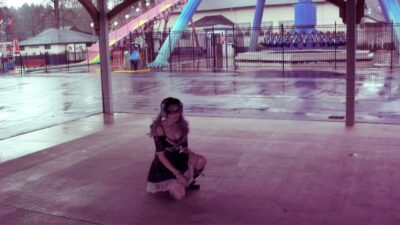

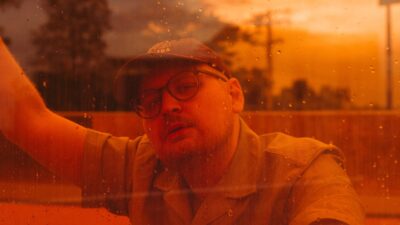
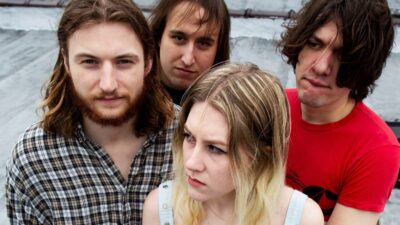

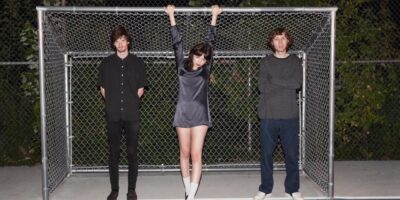

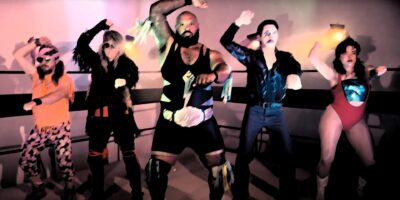
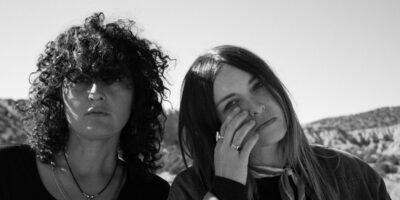
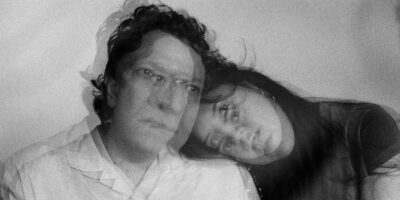




Comments